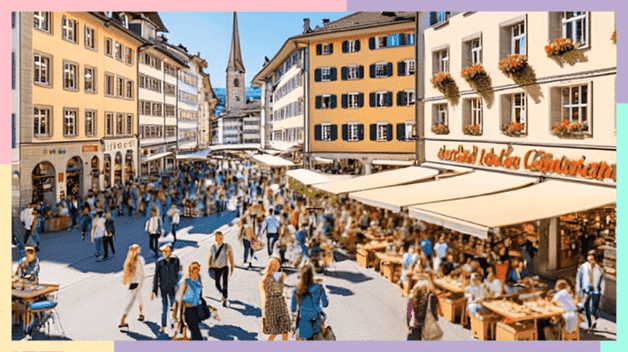The Swiss real estate market thrives as low interest rates from the Swiss National Bank (SNB) ignite a new surge in property prices, defying market expectations.
The Swiss real estate market continues to defy gravity, buoyed by the Swiss National Bank’s (SNB) persistently low interest rates. Even the anticipated shift in interest rates has failed to quell the fervor of the Swiss real estate boom, as the SNB’s monetary policy once again fans the flames of escalating property prices.
Monetary policy, as articulated by the newly appointed SNB President Martin Schlegel following the recent interest rate decision, is a delicate balancing act of various macroeconomic risks and the judicious selection of appropriate instruments. Presently, the SNB identifies the most pressing risks as the rapid decline in inflation and the sluggish performance of foreign economies. In response, swift action was deemed imperative, resulting in a reduction of the key interest rate from 1% to 0.5%.
However, this decision is not without its consequences; it entails an acceptance of heightened risks in other sectors, notably the Switzerland real estate market. The SNB elucidates that low interest rates diminish mortgage costs, rendering home ownership increasingly appealing in comparison to renting. The inevitable outcome? A surge in property prices. While this phenomenon might not pose an issue in a robust, expanding economy—where real estate values typically appreciate—the specter of price excesses looms ominously, threatening a potential market crash.
For some time now, Swiss real estate prices have soared to astronomical heights. Since the dawn of the millennium, residential property prices have more than doubled on average, with a staggering 60% increase recorded since 2010 alone. Notably, this escalation persists even when adjusted for inflation, indicating that while consumer prices remain stable or even decline, the costs associated with apartments and houses are skyrocketing.
The Swiss real estate boom has been a persistent narrative, with the magnitude of real price increases since 2010 mirroring trends observed in the United States and Germany. Yet, unlike these two nations, the Swiss market remains impervious to correction. While Germany has witnessed a recalibration of real prices—partly due to rising inflation—and the United States grappled with its own real estate bubble in the mid-2000s, Switzerland’s property prices continue their relentless ascent.
Even the anticipated interest rate turnaround has failed to stem the tide of this boom. With the advent of a new era characterized by low interest rates, the market receives yet another invigorating boost. Nevertheless, this situation raises concerns regarding vulnerability. The immediate threat of a Switzerland real estate crisis or a drastic price correction appears to have diminished, as evidenced by the UBS Real Estate Bubble Index, which indicates a decline in the risk of a nationwide bubble from “elevated” to “moderate” since 2022.
Yet, one must ponder the future implications. As Martin Schlegel himself remarked in September, “Real estate prices are fundamentally inexplicable.” The long-term ramifications of lower interest rates may exacerbate “vulnerability,” creating a precarious situation. This is the crux of the matter—not an immediate crisis, but the looming specter of inflated Switzerland real estate prices, with the potential for catastrophic fallout should the bubble eventually burst.









